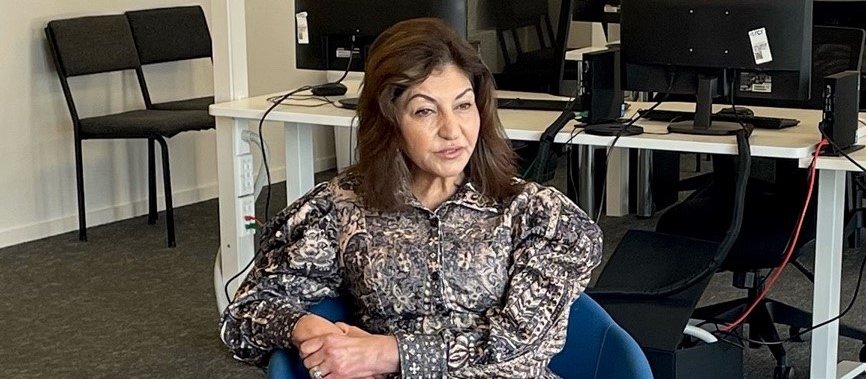Respiratory physician Lutz Beckert considers chronic obstructive pulmonary disease management, including the prevention of COPD, the importance of smoking cessation and pulmonary rehabilitation, and the lifesaving potential of addressing treatable traits. He also discusses the logic of inhaler therapy, moving from single therapy to dual and triple therapy when indicated, as well as other aspects of management
Public overestimates risks of contraceptive care, says Ōtara service
Public overestimates risks of contraceptive care, says Ōtara service

The number of adverse outcomes with LARCs is far, far exceeded by those associated with a good experience and a good service
Public perception of the risks of intra-uterine contraceptives is harming Ōtara’s long-acting reversible contraception service, says an urgent care clinical lead.
Oruba Khalil, also a specialist GP, has been at Local Doctors Ōtara, an urgent care and general practice for 25 years and inserts intra-uterine contraceptive devices every day.
Dr Khalil says when she first moved to New Zealand from Iraq, she was performing up to two or three abortions every day, often more. Finally, those numbers have turned around to reflect the clinic’s efforts towards access and visibility of contraceptive care, she says.
Tāmaki Health chief executive Lloyd McCann says the clinic has a strong and growing long-acting reversible contraception (LARC) service and has made a conscious effort to bring contraception care into the community.
LARC services are fully funded for Māori and Pacific patients, 14 to 24-year-olds, south Aucklanders, and people who have had a recent pregnancy or abortion or live with a psychiatric condition. The criteria are wide-ranging but many people still don’t know about them, Dr Khalil says.
“People don’t know [our service] exists and that it’s free,” she says. “Some people come and book and then they ask, ‘how much does it cost?’ – they haven’t been well informed.”
Dr McCann says health services need to improve on shifting public discourse, particularly when services are changing, such as the urgent care taking on contraceptive care from the hospital.
“There is going to be a transition period. Where we end up, though, is the outcomes we’re generating for people in our communities will be better, [the care] easier to access,” he says.
He acknowledges there is often a lack of good information on LARC services available to the public. Tāmaki Health needs to be more proactive about putting information out in places where patients are, he says.
Dr Khalil says she “makes everyone who comes in, sit down and watch a video on my iPad [about contraception]”. Dr McCann says they need to reach patients before that – maybe on Facebook and TikTok.
Misunderstanding about the IUD directly affects the service, Dr Khalil says.
Dr McCann adds that every procedure has the potential for complications, but the number of adverse outcomes with LARCs is far, far exceeded by those associated with a good experience and a good service.
He says there is a heightened sensitivity around IUDs, one reason being “there’s a lot of good evidence that demonstrates the structural sexism inherent in our health systems.
“If it was a men’s health issue, it would have been sorted 20 years ago,” he says.
The New Zealand Herald has reported on a patient with complications with removal of an IUD at a Tāmaki health practice.
Dr Khalil says many doctors she knows of are opting out of providing LARC care because of the perceived risk of media attention or complaints.
“I have doctors with me for 20 years now, they don’t want to touch contraception. And contraception is just normal GP work,” she says
Dr McCann says it is nothing more than perceived risk exacerbated by social media; clinicians who are feeling nervous “need to get back on the horse”.
One of Dr Khalil’s patients spoke to New Zealand Doctor Rata Aotearoa about her long and positive history with IUDs.
Mother of three Ria Vave has had three IUDs throughout her life, between each of her planned pregnancies.
Sometimes, when Ms Vave needs an IUD inserted and is feeling hesitant, “Dr [Khalil] reminds me that I have nothing to be scared of, and tells me to drink more water.”
Dr McCann says this shows the relationship aspect that is “the magic of general practice”.
Local Doctors Ōtara offers LARC care to their 20,000 enrolled patients, and has an additional walk-in service.
The clinic encourages people to book, but some people don’t have that luxury to be able to plan. So having the ability to get people in and get them the care they need on the day is huge from an access perspective,” says Dr McCann.
We're publishing this article as a FREE READ so it is FREE to read and EASY to share more widely. Please support us and our journalism – subscribe here
One of the benefits of subscribing is you will also be able to share your thoughts about what you read with other in our Comment Stream. You can also take notes on what you read with Capture






![Barbara Fountain, editor of New Zealand Doctor Rata Aotearoa, and Paul Hutchison, GP and senior medical clinician at Tāmaki Health [Image: Simon Maude]](/sites/default/files/styles/thumbnail_cropped_100/public/2025-03/Barbara%20Fountain%2C%20editor%20of%20New%20Zealand%20Doctor%20Rata%20Aotearoa%2C%20and%20Paul%20Hutchison%2C%20GP%20and%20senior%20medical%20clinician%20at%20T%C4%81maki%20Health%20CR%20Simon%20Maude.jpg?itok=-HbQ1EYA)
![Lori Peters, NP and advanced health improvement practitioner at Mahitahi Hauora, and Jasper Nacilla, NP at The Terrace Medical Centre in Wellington [Image: Simon Maude]](/sites/default/files/styles/thumbnail_cropped_100/public/2025-03/2.%20Lori%20Peters%2C%20NP%20and%20advanced%20HIP%20at%20Mahitahi%20Hauora%2C%20and%20Jasper%20Nacilla%2C%20NP%20at%20The%20Terrace%20Medical%20Centre%20in%20Wellington%20CR%20Simon%20Maude.jpg?itok=sUfbsSF1)
![Ministry of Social Development health and disability coordinator Liz Williams, regional health advisors Mary Mojel and Larah Takarangi, and health and disability coordinators Rebecca Staunton and Myint Than Htut [Image: Simon Maude]](/sites/default/files/styles/thumbnail_cropped_100/public/2025-03/3.%20Ministry%20of%20Social%20Development%27s%20Liz%20Williams%2C%20Mary%20Mojel%2C%20Larah%20Takarangi%2C%20Rebecca%20Staunton%20and%20Myint%20Than%20Htut%20CR%20Simon%20Maude.jpg?itok=9ceOujzC)
![Locum GP Helen Fisher, with Te Kuiti Medical Centre NP Bridget Woodney [Image: Simon Maude]](/sites/default/files/styles/thumbnail_cropped_100/public/2025-03/4.%20Locum%20GP%20Helen%20Fisher%2C%20with%20Te%20Kuiti%20Medical%20Centre%20NP%20Bridget%20Woodney%20CR%20Simon%20Maude.jpg?itok=TJeODetm)
![Ruby Faulkner, GPEP2, with David Small, GPEP3 from The Doctors Greenmeadows in Napier [Image: Simon Maude]](/sites/default/files/styles/thumbnail_cropped_100/public/2025-03/5.%20Ruby%20Faulkner%2C%20GPEP2%2C%20with%20David%20Small%2C%20GPEP3%20from%20The%20Doctors%20Greenmeadows%20in%20Napier%20CR%20Simon%20Maude.jpg?itok=B0u4wsIs)
![Rochelle Langton and Libby Thomas, marketing advisors at the Medical Protection Society [Image: Simon Maude]](/sites/default/files/styles/thumbnail_cropped_100/public/2025-03/6.%20Rochelle%20Langton%20and%20Libby%20Thomas%2C%20marketing%20advisors%20at%20the%20Medical%20Protection%20Society%20CR%20Simon%20Maude.jpg?itok=r52_Cf74)
![Specialist GP Lucy Gibberd, medical advisor at MPS, and Zara Bolam, urgent-care specialist at The Nest Health Centre in Inglewood [Image: Simon Maude]](/sites/default/files/styles/thumbnail_cropped_100/public/2025-03/7.%20Specialist%20GP%20Lucy%20Gibberd%2C%20medical%20advisor%20at%20MPS%2C%20and%20Zara%20Bolam%2C%20urgent-care%20specialist%20at%20The%20Nest%20Health%20Centre%20in%20Inglewood%20CR%20Simon%20Maude.jpg?itok=z8eVoBU3)
![Olivia Blackmore and Trudee Sharp, NPs at Gore Health Centre, and Gaylene Hastie, NP at Queenstown Medical Centre [Image: Simon Maude]](/sites/default/files/styles/thumbnail_cropped_100/public/2025-03/8.%20Olivia%20Blackmore%20and%20Trudee%20Sharp%2C%20NPs%20at%20Gore%20Health%20Centre%2C%20and%20Gaylene%20Hastie%2C%20NP%20at%20Queenstown%20Medical%20Centre%20CR%20Simon%20Maude.jpg?itok=Z6u9d0XH)
![Mary Toloa, specialist GP at Porirua and Union Community Health Service in Wellington, Mara Coler, clinical pharmacist at Tū Ora Compass Health, and Bhavna Mistry, specialist GP at Porirua and Union Community Health Service [Image: Simon Maude]](/sites/default/files/styles/thumbnail_cropped_100/public/2025-03/9.%20Mary%20Toloa%2C%20Porirua%20and%20Union%20Community%20Health%20Service%20in%20Wellington%2C%20Mara%20Coler%2C%20T%C5%AB%20Ora%20Compass%20Health%2C%20and%20Bhavna%20Mistry%2C%20PUCHS%20CR%20Simon%20Maude.jpg?itok=kpChr0cc)